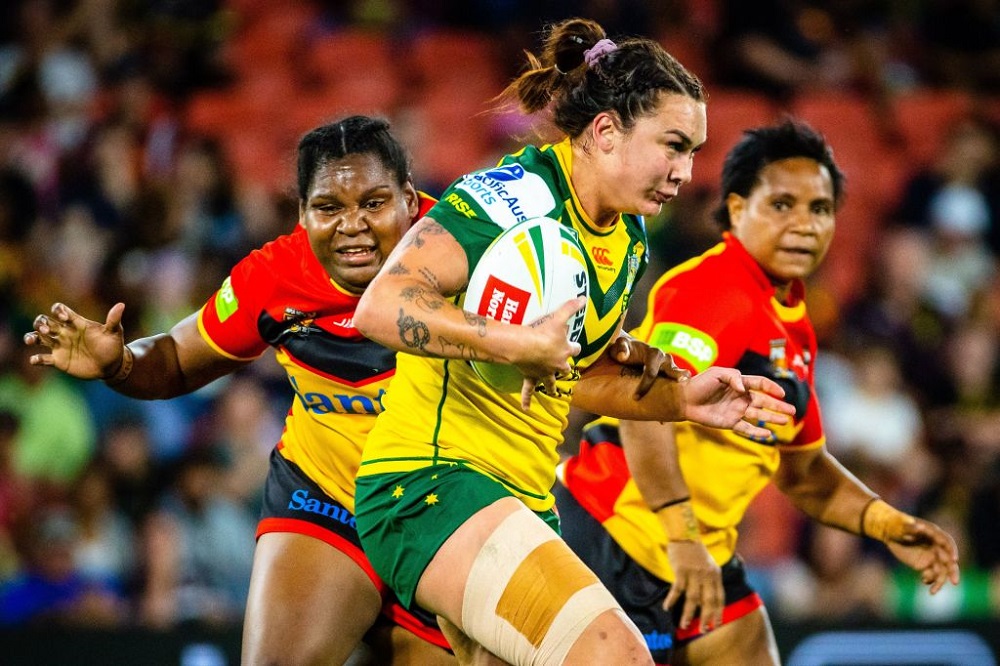Australian sports diplomacy is a sure winner in the Pacific

In a sold-out stadium in Miami on 21 March 2023, watched by a record audience worldwide, Shohei Ohtani, Japan’s talisman player, threw out the final pitch against US star player Mike Trout.
Trout, Ohtani’s former MLB teammate and good friend and one of the best hitters in baseball, swings—but can’t connect. Ohtani’s ball curves left, and just out of reach. Striking Trout out. Ohtani’s countrymen rush the field in celebration.
Japan won the Grand Classic (baseball’s answer to the various World Cups) on US soil. Lifting the trophy after a narrow 3-2 victory, the Americans lost on the international stage at their traditional national pastime. Japan fields exceptional players, the game is beloved domestically and has been for over a century, and they’ve won the Grand Classic twice before, in 2006 and 2009.
This was a historic game for these two closely allied nations, but they have played other important games in the past that helped to heal a more strained relationship. It’s how Australia, whose Sports Diplomacy 2030 strategy and PacificAus Sports program were on the periphery of our foreign policy approach, can connect better with Pacific nations.
Sport, especially baseball, has helped the US and Japan strengthen relations even when painful memories of conflict were still fresh. In November 1945, mere months after the end of World War II, US troops deployed to Japan. They, including many who had fought in the Pacific, used baseball to connect with the locals, generate goodwill and foster cultural connections. Sport has contributed significantly to postwar US-Japan relations, helping cultivate a bond between these two baseball-obsessed nations.
Australia has sports diplomacy opportunities in the Pacific which could achieve closer collaboration and close ties, whilst making a far smaller geographic jump than baseball.
In a region where strategic competition is an increasing concern, Australia can complement security pacts and other formal agreements with an event as simple as a closely-contested footy match.
Along with lofty concepts like ‘international diplomacy’, ‘grand strategy’, and ‘geopolitics’ is room for a soft power sports diplomacy strategy with practical, impactful, and highly visible outcomes.
There’s nothing quite like sport to ignite passion and bring together communities beyond cultural and socio-economic borders. At its best, sport passes over borders and language barriers, across all ages, and between socio-economic groups better than even other cultural modes. It’s a powerful diplomatic tool for governments to grab the attention of both domestic and international audiences.
Illiberal states are engaging with sports diplomacy. Consider Qatar’s 2022 FIFA World Cup, or Russia’s in 2018, Azerbaijan’s annual F1 race, or China’s stadium-building in Honiara which is fundamentally sports, not infrastructure, diplomacy. Sport is being used to change public perceptions, alter national images, and obscure human rights or other abuses.
Democracies have advantages in sports diplomacy. Australia and its Pacific neighbours are proud sporting nations. Sport brings Australians together like little else, as in the Matildas’ World Cup campaign.
Australia’s sporting history is replete with nail-biting moments—Ashes tests, Cathy Freeman’s Olympic gold medal, Australian Opens, Bledisloe Cups, and even Steven Bradbury’s improbable gold medal in speed skating.
It also includes multiple contributions by Australians of Pacific Island descent, such as football great Tim Cahill (a Samoan-English/Irish Australian), and emergent Matilda Mary Fowler (a Papua New Guinean-Irish Australian).
We need to share high-profile sporting moments with Pacific Islander teams as the US and Japan bonded over last year’s WBC.
In 2023, the Australian Government declared its support for a Papua New Guinea (PNG)-based team in the National Rugby League (NRL). This has so far received mixed reviews.
With the Australian government and Australian Rugby League commission potentially offering $60 million per year over 10 years in financial support, PNG would have its own team playing its national game against the best Australian (and New Zealand) competition.
This policy builds off groundwork laid in northern Queensland, our most rugby obsessed and Pacific-proximate region. Queensland has a long-term relationship with PNG rugby with the Queensland Cup, one tier below the NRL, including the Port Moresby-based PNG Hunters since 2013.
The Hunters won their first premiership in 2017. They are pegged to be the feeder team into a prospective PNG NRL side and are performing in that capacity for the NRL’s Redcliffe-based Dolphins.
The Hunters highlight the initiative’s popular appeal, with their home stadium in Port Moresby and their games nationally televised free-to-air in PNG.
Further supporting the team and PNG rugby are initiatives at the developmental and grassroots level with $5.5m invested in developing an academy for young PNG talent (with assistance from the prodigious Penrith Panthers academy). Australia is supporting financially PNG school rugby tours of Australia.
Rugby league alone offers a plethora of opportunities in PNG as Prime Minister James Marape reiterated last week. The game is a unifying factor in his nation, and potentially much more widely in the Pacific—noting Samoa’s strong performance in the Rugby League World Cup 2022. Future opportunities may extend to other sports such as rugby union and soccer.
A PNG-based team in the NRL is smart foreign policy. Let’s run with it.